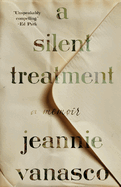
In A Silent Treatment, her third memoir, Jeannie Vanasco (The Glass Eye; Things We Didn't Talk About When I Was a Girl) examines the many ways her mother uses silence: as punishment, as retreat, as enticement, as retribution, as unspoken longing. It all began when Vanasco's mother moved into the in-law suite in Vanasco's home. What started as an elegant solution to her mother's loneliness and distance quickly morphed into something less beautiful: silent treatments, lasting anywhere from days to months, at the smallest of perceived slights. To an outsider, it is easy to label this treatment as manipulative at best, abusive at worst. But Vanasco is loath to use such black-and-white definitions, instead placing these silences under a writer's microscope: "I resent what my mom did and is doing, and I don't want to write out of resentment. I don't resent my mom, however."
In fact, Vanasco dedicates the book to her mother, writes with her mother's consent and encouragement, and includes annotations and comments from her mother throughout. "(Mom: If I didn't want you to write about it, I shouldn't have done it.)" In Vanasco's skilled hands, A Silent Treatment peels back the layers of these maternally inflicted silences, grappling with not only how it feels to experience them, but how it feels to write about them. "A mother inherently has so much power over a child," she writes, "but a writer has so much power over any person they're writing about." Vanasco wields that power carefully in this striking literary memoir, drawing on history, scientific research, and her own experiences to examine the all-consuming effect of words unspoken. --Kerry McHugh, freelance writer

